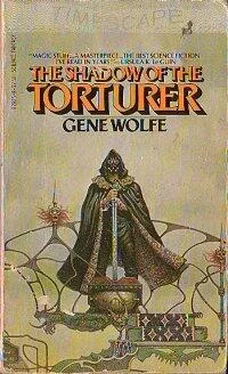“But I didn’t want a new dress from there because I would have had to wear it for a long time, and it would always have reminded me of that day. You can buy me a dress now, if you like, because it will remind me of this day, when I thought you were dead when you were really well.
“Anyway, we got back into the city somehow. I was hoping to find a place to stop where you could lie down, but there were only big houses with terraces and balustrades. That sort of thing. Some soldiers came galloping up and asked if you were a carnifex. I didn’t know the word, but I remembered what you had told me and so I told them you were a torturer, because soldiers have always seemed to me to be a kind of torturer and I knew they would help us. They tried to get you to ride, but you fell off. So some of them tied their capes between two lances and laid you on that, and put the ends of the lances in the stirrup straps of two destriers. One of them wanted to take me up into his saddle, but I wouldn’t do it. I walked beside you all the way and sometimes I talked to you, but I don’t think you heard me.”
She drained the last of the broth. “Now I want to ask you a question. When I was washing myself behind the screen, I could hear you and Agia whispering about a note. Later you were looking for someone in the inn. Will you tell me about that?”
“Why didn’t you ask before?”
“Because Agia was with us. If you had found out anything, I didn’t want her to hear what it was.”
“I’m sure Agia could discover anything I discovered,” I said. “I don’t know her well, and in fact I don’t feel I know her as well as I know you. But I know her well enough to realize that she’s much cleverer than I am.” Dorcas shook her head again. “She’s the sort of woman who’s good at making puzzles for other people, but not at solving ones she didn’t make herself. I think she thinks—I don’t know—side-wise. So no one else can follow it. She’s the kind of woman people say thinks like a man, but those women don’t think like real men at all, in fact, they think less like real men than most women do. They just don’t think like women. The way they do think is hard to follow, but that doesn’t mean it’s clear, or deep.”
I told her about the note, and what it said, and mentioned that although it had been destroyed I had copied it out on the inn’s paper and found it to be the same paper, and the same ink.
“So someone wrote it there,” she said pensively. “Probably one of the inn servants, because he called the ostler by name. But what does it mean?”
“I don’t know.”
“I can tell you why it was put where it was. I sat there, on that horn settee, before you sat down. It made me happy, I recall, because you sat beside me. Do you remember if the waiter—he must have carried the note, whether he wrote it or not—put the tray there before I got up to bathe?”
“I can remember everything,” I said, “except last night. Agia sat in a folding canvas chair, you sat on the couch, that’s right, and I sat down beside you. I had been carying the avern on the pole as well as my sword, and I laid the avern flat behind the couch. The kitchen girl came in with water and towels for you, then she went out and got oil and rags for me.”
Dorcas said, “We ought to have given her something.”
“I gave her an orichalk to bring the screen. That’s probably as much as she’s paid for a week. Anyway, you went behind it, and a moment later the host led the waiter in with the tray and wine.
“That’s why I didn’t see it, then. But the waiter must have known where I was sitting, because there was no place else. So he left it under the tray, hoping I’d see it when I came out. What was the first part again?”
“ ‘The woman with you has been here before. Do not trust her.’ “ “It must have been for me. If it had been for you, it would have distinguished between Agia and me, probably by hair color. And if it had been meant for Agia, it would have been out on the other side of the table where she would have seen it instead.”
“So you reminded someone of his mother.”
“Yes.” Once more there were tears in her eyes.
“You’re not old enough to have had a child who could have written that note.”
“I don’t remember,” she said, and buried her face in the loose folds of the brown mantle.
When the physician in charge had examined me and found I had no need of treatment, he asked us to leave the lazaret, where my cloak and sword were, as he said, upsetting to his patients.
On the opposite side of the building in which I had eaten with the troopers, we found a shop that catered to their needs. Together with false jewelry and trinkets of the sort such men give their paramours, it carried a certain amount of women’s clothing; and though my money had been much depleted by the dinner we had never returned to the Inn of Lost Loves to enjoy, I was able to buy Dorcas a simar.
The entrance to the Hall of Justice was not far from this shop. A crowd of a hundred or so was milling before it, and since the people pointed and elbowed one another when they caught sight of my fuligin, we retreated again to the courtyard where the destriers were tethered. A portreeve from the Hall of Justice found us there—an imposing man with a high, white forehead like the belly of a pitcher. “You are the carnifex,” he said. “I was told you are well enough to perform your office.”
I told him I could do whatever was necessary today, if his master required it. “Today? No, no, that’s not possible. The trial won’t be over until this afternoon.”
I remarked that since he had come to make certain I was well enough to carry out the execution, he must have felt certain the prisoner would be found guilty. “Oh, there’s no question of that—not the least. Nine persons died, after all, and the man was apprehended on the spot. He’s of no consequence, so ther’s no possibility of pardon or appeal. The tribunal will reconvene at midmorning, but you won’t be required until noon.”
Because I had had no direct experience with judges or courts (at the Citadel, our clients had always been sent to us, and Master Gurloes deal; with those officials who occasionally came to inquire about the disposition of some case or other), and because I was eager to actually perform the act in which I had been drilled for so long, I suggested that the chiliarch might wish to consider a torchlight ceremony that same night.
“That would be impossible. He must meditate his decision. How would it look? A great many people feel already that the military rnagistrates are hasty and even capricious. And to be frank, a civil judge would probably have waited a week, and the case would be all the better for it, since there would have been ample time, then, for someone to come forward with fresh evidence, which of course no one will actually do.”
“Tomorrow afternoon then,” I said. “We’ll require quarters for the night. Also I’ll want to examine the scaffold and block, and ready my client. “Will I need a pass to see him?”
The portreeve asked if we could not stay in the lazaret, and when I shook my head, we—the pcrtreeve, Dorcas, and I—went there to permit him to argue with the physician in charge, who, as I had predicted, refused to have us. That was followed by a lengthy discussion with a noncommissioned officer of the xenagie, who explained that it was impossible for us to stay in the barracks with the troopers, and that if we were to use one of the rooms set aside for the higher ranks, no one would want to occupy it in the future. In the end a little, windowless storeroom was cleared out for us, and two beds and some other furniture (all of which had seen hard use) brought in. I left Dorcas there, and after assuring myself that I was unlikely to step through a rotten board at the critical moment, or to have to saw the client’s head off while I held him across my knee, I went to the cells to make the call that our traditions demand. Subjectively at least, there is a great difference between detention facilities to which one has become accustomed and those to which one has not. If I had been entering our own oubliette, I would have felt I was, quite literally, coming home—perhaps coming home to die, but coming home nevertheless. Although I would have realized in the abstract that our winding metal corridors and narrow gray doors might hold horror for the men and women confined there, I would have felt nothing of that horror myself, and if one of them had suggested I should, I would have been quick to point out their various comforts—clean sheets and ample blankets, regular meals, adequate light, privacy that was scarcely ever interrupted, and so on.
Читать дальше










